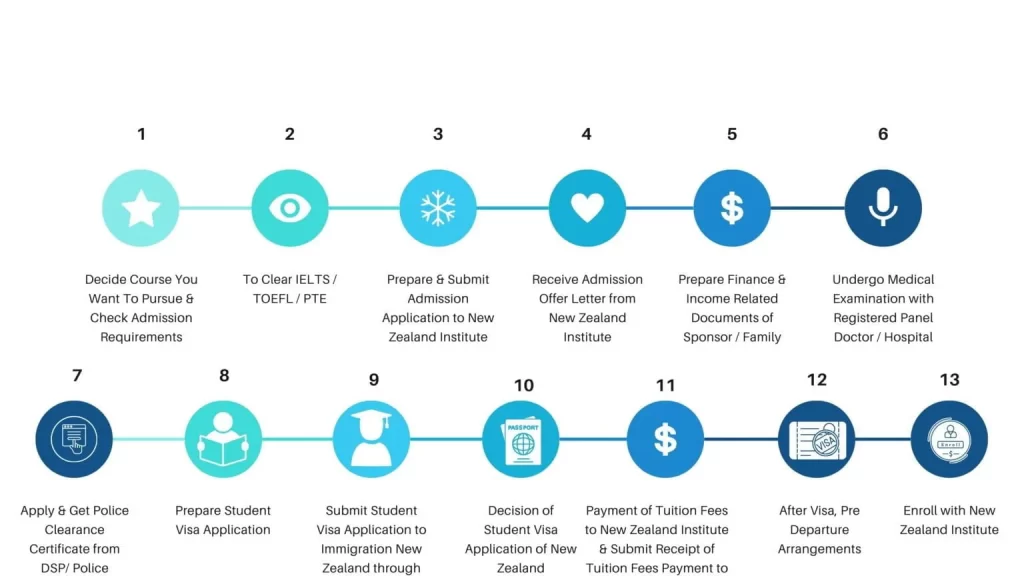
We are the Best New Zealand Study Visa Consultants in Jammu

Discovering New Zealand as your destination for studying, working, and settling offers a multitude of opportunities. Navigating this journey involves securing a student visa for education, exploring career prospects, and understanding residency requirements. Our comprehensive guidance aims to streamline your path toward achieving your aspirations in this vibrant and welcoming country.
Reasons Immigrants Choose New Zealand
- Quality of Life
- Breathtaking Landscapes
- Multicultural Society
- Education and Healthcare
- Job Opportunities
- Favorable Immigration Policies
Education
New Zealand is renowned for its high quality and innovative educational approach. Here are some key points:
- Quality Institutions
- Innovative Teaching
- Safe Learning Environment
- Cultural Diversity
- Strong Support Systems
- Global Recognition
Unlock your potential and embrace a world of opportunities—study in New Zealand with Immi Talks, where your educational journey leads to a brighter future!
New Zealand’s education system typically follows two major intakes:
- Semester System:
- First Semester: Starts in late February or early March and runs through June or July.
- Second Semester: Begins in July and ends in November.
- Trimester System:
Some institutions follow a trimester system with three terms:
- Term 1: March to June
- Term 2: July to October
- Term 3: November to February
It’s essential to check with specific institutions as some might have additional intakes or different schedules for specific courses or programs.

Top Universities in New Zealand
- University of Auckland
- University of Otago Victoria
- University of Wellington
- Massey University
- Auckland University of Technology (AUT)
Popular Courses in New Zealand
- Bachelor of Science
- Bachelor of Arts
- Bachelor of Commerce
- Bachelor of Engineering
- Bachelor of Medicine and Bachelor of Surgery (MBChB)
- Master of Business Administration (MBA)
- Master of Science
- Master of Arts
- Master of Engineering Doctor of Philosophy (PhD)


Experience Exceptional Service and Real Results with Us—Your Success is Our Commitment

Scholarships
New Zealand Scholarships
- University of Auckland International Student Scholarships
- Victoria University of Wellington International Excellence Scholarships
- University of Otago Research Scholarships
- University of Canterbury Scholarships for International Students
Total Expenses for a year in the New Zealand as a student:
In New Zealand, the total expenses for a study visa for a year depend on various factors like tuition fees, accommodation, living costs, and additional expenses. On average, it might range from NZ$20,000 to NZ$40,000 or higher for one year of study.
Working Rights
In New Zealand, international students with a valid student visa generally have the right to work part-time for up to 20 hours per week during the academic year and full-time during scheduled holidays.
After completing their studies, students might be eligible for a post-study work visa, allowing them to work in New Zealand for a certain period to gain practical work experience related to their studies. The duration of this visa can vary based on factors such as the level of qualification attained and the location of study.
PR Programs
Here are the main PR programs in New Zealand:
- Skilled Migrant Category (SMC)
- Work to Residence Visas
- Family Category
- Investor Category
Ready to Turn Your Dreams into Reality? Let’s Make It Happen Together with Immi Talks—Your Journey Starts Here.
Student Testimonials

Avinas Gupta
I can't express how grateful I am to Immi Talks for guiding me through the process of studying in New Zealand. Their team was incredibly supportive, and they helped me secure a scholarship that made my dream affordable!

Jitendra Jaiswal
The scholarship opportunities provided by Immi Talks opened doors I never thought possible. Their commitment to helping students achieve their dreams is truly inspiring.

Pritam Nagre
Thanks to Immi Talks, I received excellent advice on choosing the right program and university. Their team's encouragement and expertise were exactly what I needed!

Anant Goswami
Immi Talks is a lifesaver! They guided me through the visa application process, and I couldn't have done it without their support. I'm now studying at my dream university!

Vijay Chauhan
I highly recommend Immi Talks for anyone considering studying in New Zealand. Their comprehensive guidance and friendly staff made the process so much easier!
FAQ
How do I apply for a student visa in New Zealand?
What are the entry requirements for New Zealand universities?
Can I work while studying in New Zealand on a student visa?
How can I find accommodation as an international student in New Zealand?
What healthcare options are available for international students in New Zealand?
Most international students in New Zealand are required to have health insurance. Some universities offer their own insurance plans, while others may allow students to choose private health insurance that meets certain criteria.
Are there scholarships available for international students in New Zealand?
How do I open a bank account in New Zealand as an international student?
Can I travel within New Zealand and to other countries during my studies?
How can I extend my stay in New Zealand after completing my studies?
Canada offers various post-graduation work permits (PGWP) that allow international students to work in Canada after completing their studies. The eligibility criteria depend on the duration and type of study program.

